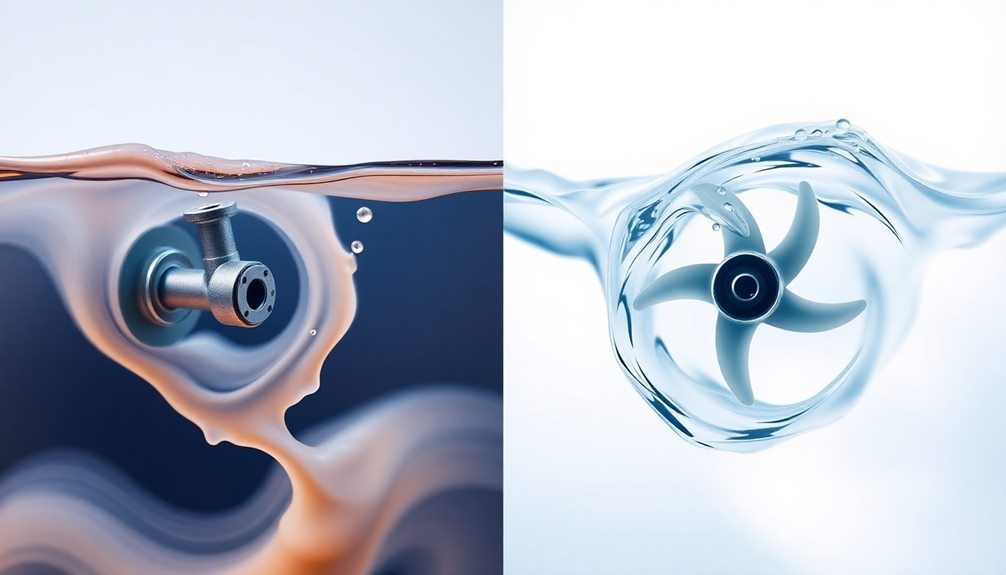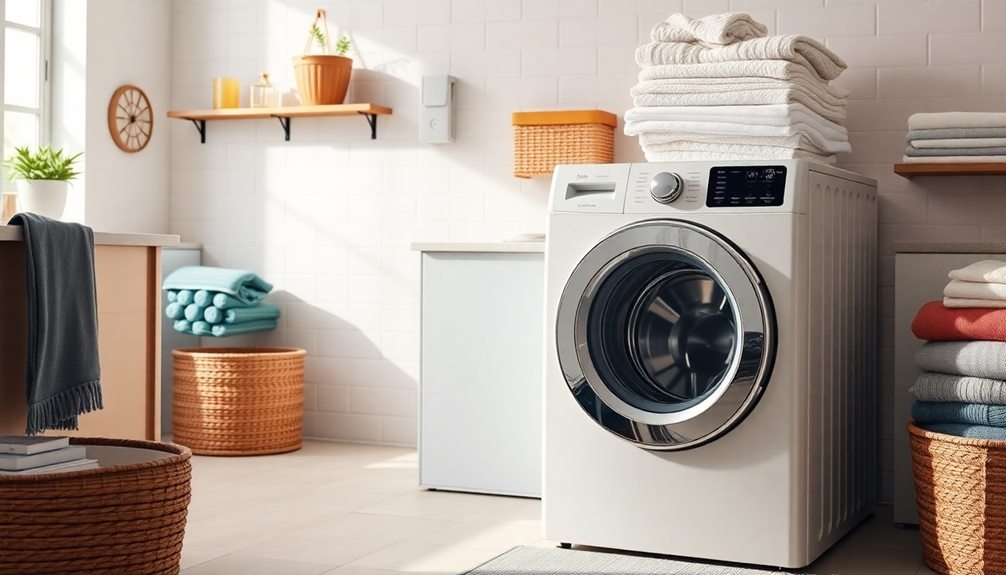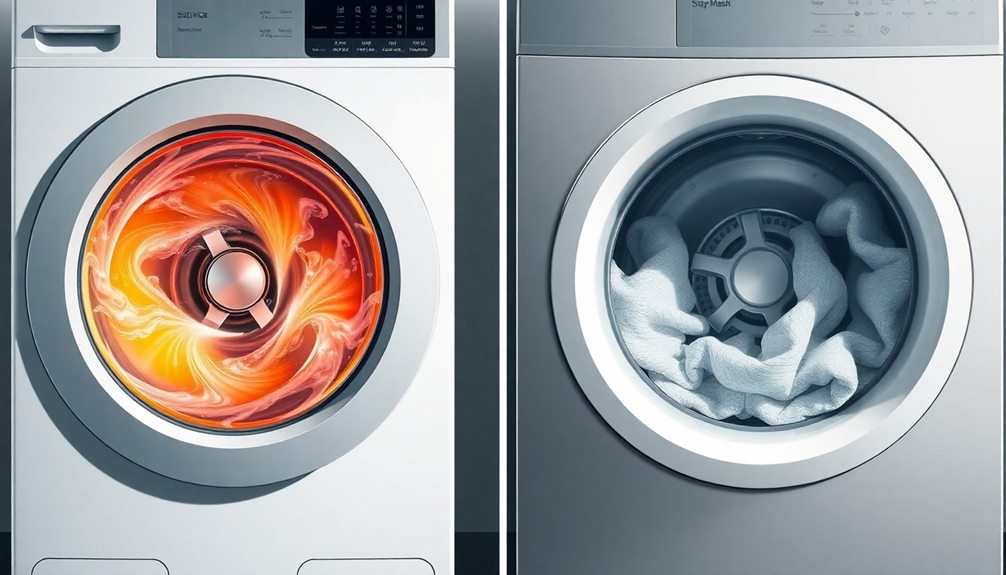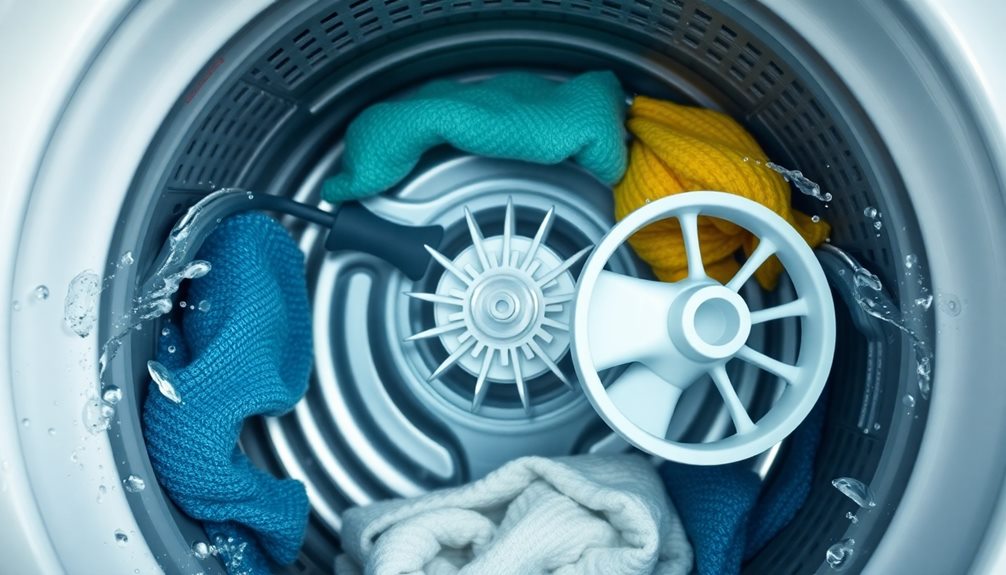When choosing between agitator and impeller washers, consider their key differences. Agitators excel at cleaning heavily soiled items quickly, making them ideal for tough stains, but they do use more water and can be harsher on fabrics. On the other hand, impellers are gentler on clothes, use less water, and allow for larger loads, but may take longer to wash. Agitators are often more affordable, while impellers may have a higher price due to newer designs. Understanding these pros and cons can greatly influence your laundry choices. There's more to discover about which fits your needs best.
Key Takeaways
- Agitator washers excel at cleaning heavily soiled items due to their vigorous twisting motion, making them effective for tough stains.
- Impeller washers are gentler on fabrics, minimizing wear and extending the life of delicate items through their low-profile design.
- Agitators typically require higher water levels, while impellers are more water-efficient, promoting lower utility bills and eco-friendliness.
- Agitator models generally have shorter wash cycles, allowing for quicker laundry completion compared to the longer cycles of impeller washers.
- The price range for agitators is more budget-friendly ($550-$700), while impellers tend to be pricier ($600-$1,400) due to advanced technology.
Overview of Washers
When choosing a washer, what factors do you consider most important? The type of washer you select can greatly impact your laundry experience.
You'll find two primary designs: agitator and impeller washers. Agitator washers feature a central post that moves your clothes with a twisting motion, making them particularly effective for cleaning heavily soiled items. If you often wash dirty work clothes or sports gear, an agitator might be your best bet.
On the other hand, impeller washers utilize a low-profile cone or disc, generating currents for a gentler cleaning action. This design is ideal for delicate fabrics and larger loads, as it provides a more nuanced approach to washing. Understanding these differences is essential, as your choice will affect water efficiency, cleaning performance, and fabric care.
Price is another important factor. Agitator models typically range from $550 to $700, while impeller models can cost between $600 and $1,400.
Understanding Agitators

Agitators play an essential role in how effectively your washer cleans clothes. In top-load washing machines, an agitator is a central post equipped with vanes that twists back and forth. This motion creates friction, which helps dislodge dirt and stains from your fabrics, enhancing overall cleaning performance.
If you frequently wash heavily soiled loads, you'll appreciate the power of an agitator washer. These machines typically require higher water levels, which helps guarantee that clothes are submerged for peak cleaning. The unique design of agitators allows for a variety of washing motions, making them effective for tough cleaning tasks while minimizing damage to your clothes.
You might find that agitator washers have shorter cycle times, allowing you to finish laundry faster. However, keep in mind that they can use more water and may be harsher on delicate fabrics compared to other options.
Popular models like the Speed Queen® TC5 and Maytag® 3.8 cu. ft. are known for their robust construction and user-friendly settings, catering to your traditional laundry needs while delivering impressive results on heavily soiled garments.
Understanding Impellers

Impellers offer a modern approach to laundry cleaning with their low-profile design, which sits at the center of top-loading washers. These devices utilize a rotating cone or disc to create currents that gently move clothes through the wash water, providing a softer cleaning action compared to traditional agitators. This gentler method makes impeller washers ideal for delicate fabrics, minimizing the risk of damage.
Additionally, impeller washers require less water than their agitator counterparts, promoting energy efficiency and potentially lowering your utility bills. The design allows for increased drum capacity, accommodating larger loads and bulky items like comforters without the constraints of a central post. You'll notice that high spin speeds in impeller washers enhance moisture extraction, resulting in shorter drying times for your laundry.
Here's a quick comparison of impeller washers versus agitators:
| Feature | Impeller Washers |
|---|---|
| Cleaning Action | Gentle currents |
| Water Usage | Less than agitators |
| Load Capacity | Larger, bulkier items |
| Drying Time | Shorter due to high spin |
Understanding these differences can help you choose the right washer for your needs!
How They Work

To understand how agitator and impeller washers work, you need to look at their mechanisms.
Agitators use a central spindle that twists to create friction, while impellers rely on a spinning disc to move clothes against each other.
This difference in functionality affects their cleaning efficiency and the care they provide for your fabrics.
Agitator Mechanism Explained
The mechanism behind an agitator washer revolves around its tall central spindle, which features vanes that twist back and forth. This twisting motion creates friction against your clothes, effectively dislodging dirt and soil during the cleaning process.
As the agitator moves, it combines multiple washing actions, allowing it to tackle tough stains without damaging your fabrics. Agitator washers typically operate with higher water levels, which enhances detergent distribution and guarantees thorough rinsing. This design allows the detergent to penetrate fabrics better, leading to cleaner clothes.
Plus, because they usually have shorter cycle times, agitator washers can be a great choice for frequent use and quick laundry needs, making it easy to keep up with your household's demands.
However, it's worth noting that the design of these agitators can limit drum space. This can make it challenging to wash larger or bulkier items effectively. If you often wash oversized items, you might need to take this aspect into account when choosing your washer.
Impeller Functionality Overview
In contrast to agitators, impeller washers use a low-profile cone or disc that spins to create currents, gently moving clothes through the wash basket for effective cleaning. This impeller functionality generates centrifugal force, ensuring an even distribution of water and detergent throughout your laundry load. As a result, you'll experience a more thorough cleaning without the harsh agitation that can wear out your fabrics.
One of the biggest advantages of impeller washers is their energy efficiency. They require less water than traditional agitators, making them environmentally friendly while still delivering a powerful clean. The gentle cleaning action of the impeller reduces the risk of fabric damage, making these washers suitable for delicate items and larger loads without tangling.
Additionally, many impeller washers are designed with high spin speeds, which helps extract more moisture from your clothes. This means shorter drying times, saving you energy and time.
Cleaning Efficiency Comparison
Understanding how agitators and impellers work can help you decide which washer suits your cleaning needs better. When it comes to cleaning efficiency, both types have their unique strengths.
- Cleaning Power: Agitator machines use a central spindle with fins that create a twisting motion, generating friction to effectively tackle heavily soiled loads. If you often deal with dirt and stains, the vigorous action of an agitator might be your best bet.
- Gentler Approach: Impeller washing machines, on the other hand, feature a low-profile disc that spins to create gentle currents. This method evenly distributes detergent while reducing the risk of fabric damage, making it ideal for delicate items.
- Cycle Efficiency: While agitators usually have shorter cycle times, impellers may require longer cycles to achieve effective cleaning.
However, impeller machines are more water and energy-efficient, using less water per cycle compared to agitators.
Comparing Agitator and Impeller

When it comes to choosing between agitator and impeller washers, recognizing their key differences is essential for making the right decision.
Agitator washers use a central post with fins, creating a twisting motion that effectively removes tough stains. This aggressive cleaning action makes them ideal for heavily soiled loads but may cause more wear on fabrics.
In contrast, impeller washers feature a low-profile cone or disc that generates currents to gently move clothes, allowing for larger drum capacity and accommodating bulkier items.
While agitators typically require higher water levels and faster wash cycles, impellers are generally more energy-efficient, using less water and resulting in lower utility bills.
You'll find that agitator washers usually range from $550 to $700, while impeller models range from $600 to $1,400, reflecting the newer technology and features in impeller washers.
If you prioritize efficiency and gentleness on delicate fabrics, an impeller washing machine may be your best option. On the other hand, if you often tackle heavily soiled laundry, an agitator washer could be more effective in getting the job done.
Pros of Agitator Washers

Agitator washers offer several compelling advantages that make them a popular choice for many households. If you're looking for an effective laundry solution, consider these key benefits:
- Powerful Cleaning: The vigorous twisting motion of agitator washers effectively removes tough stains and odors, ensuring your clothes come out fresh and clean. This makes them perfect for heavily soiled items like work clothes and sports gear.
- Quick Wash Cycles: Agitator models typically feature shorter wash cycles, allowing you to get through laundry faster. This is ideal for busy households where time is of the essence.
- Budget-Friendly Option: Generally, agitator washers are more affordable compared to impeller models. This means you can enjoy great cleaning performance without breaking the bank.
Additionally, the tall central post in agitator washers helps create a higher water level, promoting better detergent distribution and soil removal.
Their design also makes them compatible with various fabrics, making them a versatile choice for all your laundry needs.
Pros of Impeller Washers

Impeller washers are great for maximizing space in your laundry room, thanks to their low-profile design that allows for larger drum capacity.
You'll also appreciate how gentle they're on fabrics, helping to extend the life of your clothes.
With these benefits, impeller washers offer a smart choice for efficient and careful cleaning.
Space Efficiency
With their low-profile design, impeller washers maximize drum capacity, making them a smart choice for anyone looking to wash larger loads or bulky items like comforters.
Their innovative structure enhances space efficiency in several ways:
- Increased Usable Space: The absence of a central agitator means you can fit more clothes in the wash basket without compromising cleaning power. This allows you to tackle larger laundry loads in one go.
- Less Water Usage: Impeller washers create currents that move clothes through the wash, requiring less water than traditional models. This not only saves water but also enhances space efficiency since you don't need a full drum to clean effectively.
- Flexible Footprint: Many impeller models have a larger overall footprint, offering flexibility in your laundry room layout. You can fit these machines into tighter spaces while ensuring proper ventilation for modern appliances.
Ultimately, if you value maximizing your laundry space and improving efficiency, impeller washers stand out as an excellent choice.
You'll find you can handle bulky laundry with ease while enjoying the benefits of better air circulation and shorter drying times.
Gentle on Fabrics
Choosing an impeller washer can greatly benefit your delicate fabrics. Unlike traditional agitators, which can be harsh and abrasive, impeller washers utilize a low-profile design that gently moves clothes through the wash.
This motion reduces the risk of damage to delicate items, making them an excellent choice for your most treasured garments. The spinning action of impellers creates currents in the water, effectively cleaning your laundry while minimizing wear and tear on fabrics.
With less friction generated during the wash cycle, you're less likely to experience pilling or snagging, especially on soft textiles like silk and lace. This gentle approach is particularly beneficial for items that require special care, such as activewear and delicate lingerie.
Considerations for Choosing

When it comes to selecting between agitator and impeller washers, several key factors can influence your decision. Understanding your specific laundry needs is essential for making the right choice.
- Typical Laundry Load: If you often wash heavily soiled items, an agitator might be your best bet. However, if you frequently handle delicate fabrics or bulkier loads, an impeller washer excels in those situations.
- Water and Energy Efficiency: Impeller washers generally use less water and provide energy savings compared to agitator models. If you're looking to be more environmentally friendly, this could be a significant factor.
- Cycle Times: Agitator washers typically offer faster wash cycles, which is beneficial for households with high laundry demands. If time is of the essence, this is worth considering.
Additionally, think about the available space in your laundry area. Impeller washers usually have a larger drum capacity, allowing you to wash bigger loads without taking up extra room.
Maintenance is another point; agitators may need more frequent cleaning due to their design, while impellers can trap dirt and lint over time.
Top Recommendations

Selecting the right washer can make a significant difference in your laundry routine, so here are some top recommendations for both agitator and impeller models.
If you're leaning towards an agitator washing machine, consider the Speed Queen® TC5. It boasts a 3.2 cu. ft. capacity and is built for heavy-duty cleaning, ensuring reliability for years.
Another great option is the Maytag® 3.8 cu. ft., which features a PowerWash® agitator known for its impressive stain-fighting performance.
For those interested in versatility, the Whirlpool® 5.2-5.3 cu. ft. model offers a removable agitator, making it perfect for washing bulky items like king-size comforters.
Now, if you're leaning towards impeller washers, the GE® 4.8 cu. ft. Impeller Washer is a solid choice, featuring a soak option that tackles stubborn grime effectively.
Frequently Asked Questions
Is It Better to Have an Agitator or Impeller?
Choosing between an agitator and an impeller depends on your laundry needs. If you tackle tough stains often, an agitator's power suits you. For gentler care and larger loads, an impeller might be your best bet.
What Are the Disadvantages of an Impeller Washing Machine?
Using an impeller washing machine's like dancing with a partner who twirls too gently; you might find it takes longer to clean your clothes, struggle with stubborn stains, and face frequent maintenance while juggling tangled fabrics.
What Are the Pros and Cons of Agitators?
Agitators offer powerful cleaning, tackling tough stains efficiently and providing quicker wash cycles. However, they can wear out clothes faster and require more water, which might not be ideal for delicate fabrics or eco-conscious consumers.
When Should You Not Use an Agitator?
You shouldn't use an agitator for delicate fabrics, bulky items, or lightly soiled clothes. Instead, consider gentler alternatives that protect your garments, conserve water, and minimize noise—ensuring your laundry experience remains efficient and effortless.
Conclusion
Choosing between agitator and impeller washers is like picking between two great friends; each has unique strengths that suit different needs. Agitators offer robust cleaning power, while impellers provide a gentler touch and more energy efficiency. Think about your laundry habits and space constraints to find the perfect fit for your home. Ultimately, the right washer can make laundry day smoother and more enjoyable, transforming a chore into a breeze. Happy washing!









